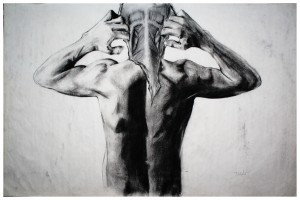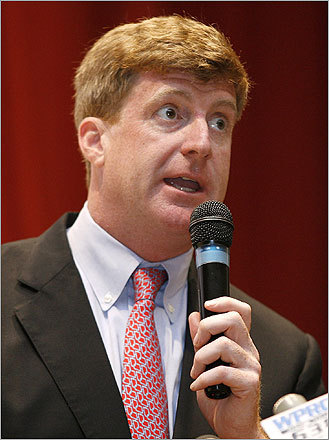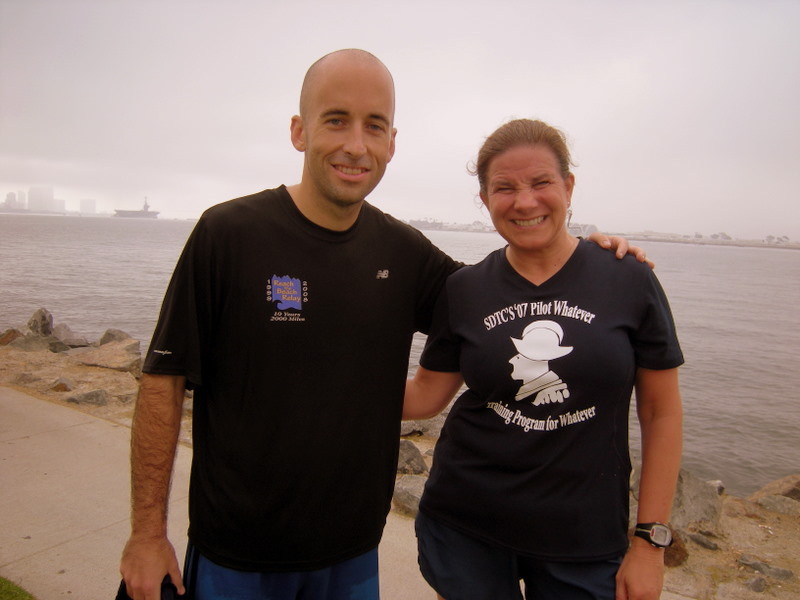The author finds airport amusement where he once found hell. Here’s what happens.
Mood music for this post: “Learn to Fly” by Foo Fighters:
[youtube=http://www.youtube.com/watch?v=1VQ_3sBZEm0&hl=en_US&fs=1&]
I sit here at 6:23 a.m. San Francisco time, sitting at the gate for a flight home in an hour. Considering what I just passed through, I got here pretty quickly and calmly.
Let’s back up.
When I got here, the TSA line was as long as I’ve ever seen. Directly ahead of me in line were 40 or so tweens headed on a trip to Gettysburg and Washington D.C.
Finding MY food was more trouble than I expected, but I found what I needed. I also found some coffee that was made following my friend Ken White’s recipe.
A few minutes later, I found a Peet’s Coffee stand and things immediately started looking up. I tossed the “White” blend in the trash and got my rocket fuel.
All things considered, I’m in a chipper mood. I keep thinking of airport disaster movies and it makes me laugh. I find myself searching Youtube for some Lynard Skynard videos. Some of you might remember that half that band went down in a plane crash. That’s how my gallows humor works.
I have plenty of reasons to be happy. I’m going home to my family, who I miss. Our security conference was a smashing success. And each night here I caught up with many of the cool people I’m connected with on Twitter.
The weather has also been pretty brilliant, though strangely cooler than it was back home this week.
But there are other reasons to feel this way.
For one thing, I stuck to my plan of recovery and kept my strict alcohol-flour-sugar-free eating program intact. I also didn’t feel the edge around people drinking booze that I felt on the last trip.
I wasn’t perfect. I drank A LOT of caffeine, even by my standards, and smoked more cigars than I normally do. Maybe that’s why I didn’t feel the edge around the liquor.
Ah, addictions. You put two of them down and three more pop up.
But when I think of how much I’ve polluted myself on past trips over the years, this is pretty good behavior.
There’s actually an even bigger reason I’m in a good mood: Trips through airports used to terrify me. It was one of the top freak-out items on my OCD-anxiety itinerary. I’d live the weeks leading up to a trip worrying about whether the plane will drop from the sky. Long lines would send my blood pressure soaring until my head was ready to go supernova.
Sitting on the plane for five or more hours was pure hell because closed-in spaces triggered anxiety attacks, the kind where you have trouble breathing and you see spots in your vision.
I would get home and collapse from the exhaustion.
So here we are, years after I started the therapy and found the 12 Steps of recovery. Oh yeah, and Prozac.
The TSA line doesn’t freak me out anymore. I chatted easily with the fellow overseeing the traveling tweens and with a couple of the kids. All the kids were actually very well behaved and polite.
Being on a plane now brings me peace. I look out the window and see how vast and amazing this country is. If the weather is gray, the pilot will fly us above it to a sky of blue.
Maybe I’ll get some sleep. Maybe I’ll listen to my music or read, or some of each.
Then I’ll land in Boston and get a ride home from a good friend.
Then I’ll see my wife and kids, who I’m eager to see again.
I was talking to a good friend at a meet-up last night — Ed Bellis, chief information security officer for Orbitz — and he asked me if I ever return to the darker feelings of my past.
Sure I do. Managing a mental disorder and its related addictions is hard work and you never stop feeling the ups and downs of life. Nor should you.
I still feel anger and even a little fear sometimes. But instead of those things controlling me, they are now more minor occurrences.
I still get tired. And with addiction, you’re always half a second away from potentially slipping on your darkest habits.
And I definitely go through a day here or week there where depression sets in. That’s normal.
But I told him — truthfully — that there are some things about the old me that will never and can never return.
I can’t see ever having the anxiety attacks and fear I used to have, though I suppose anything is possible. I’ve seen too many of the things I missed to ever turn back. Even if I lapse back into periods of anxiety (I hope not!) there’s no turning back.
My eyes have been opened to a whole new world and going back to the dark room — which is something I used to crave — is now one of those things I’d dread instead.
Another friend, Jen Leggio (@mediaphyter on Twitter), asked me how I manage to write something new in this blog every day while maintaining the writing load I carry on the work side.
My answer is simple:
Back when fear, anxiety and depression led me to binge eat and spend 80 hours a week working out of fear that I might not please everyone (Man, that was fucking dumb), I was constantly wiped out. I would sleep all the way through my weekends.
As a result, writing was hard and stressful.
Now that I’ve learned to get out of my own way, writing comes easily, whether it’s here or in the security realm. I can write a lot more because I don’t feel the least bit of stress about it. I love it, so I do it.
The other thing I chalk it up to is Faith. As my Faith in God deepens, I realize that the things I used to freak out over are trivial items that I can’t take with me into the next life. So getting worked up about them seems pointless.
I know there’s always the chance I can slip backwards. Indeed, setbacks are a natural part of recovery. I like to call those moments growing pains.
But yeah, in the big picture, I’m one grateful SOB.
Now to board the plane. I’m in the middle of my annual reading of Helter Skelter, so I guess I’ll do that until I happily pass out.
End music: “Times Like These” by Foo Fighters:
[youtube=http://www.youtube.com/watch?v=rhzmNRtIp8k&hl=en_US&fs=1&]









 I’ve been there. Migraines. Brutal back pain. A stomach turned inside-out.
I’ve been there. Migraines. Brutal back pain. A stomach turned inside-out.